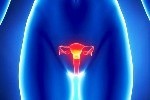Ectopic pregnancy
An ectopic pregnancy occurs when the fertilized egg attaches itself in a place other than inside the uterus. Almost all ectopic pregnancies occur in a fallopian tube, and are thus sometimes called tubal pregnancies. The fallopian tubes are not designed to hold a growing embryo; the fertilized egg in a tubal pregnancy cannot develop normally and must be treated. An ectopic pregnancy happens in 1 out of 50 pregnancies.
What causes an ectopic pregnancy
Ectopic pregnancies are caused by one or more of the following:
- An infection or inflammation of the fallopian tube can cause it to become partially or entirely blocked.
- Scar tissue left behind from a previous infection or an operation on the tube may also impede the egg's movement.
- Previous surgery in the pelvic area or on the tubes can cause adhesions.
- An abnormality in the tube's shape can be caused by abnormal growths or a birth defect.
Who is at rick to have an ectopic pregnancy?
Women who are more at risk for having an ectopic pregnancy include the following:
- Are 35-44 years of age
- Have had a previous ectopic pregnancy
- Have had pelvic or abdominal surgery
- Have pelvic inflammatory disease (PID)
- Have had several induced abortions
- Women who get pregnant after having a tubal ligation or while an IUD is in place
- Women who smoke
- Have endometriosis
- Have undergone fertility treatments or are using fertility medications
The symptoms of an ectopic pregnancy
Although you may experience typical signs and symptoms of pregnancy, the following symptoms may be used to help recognize a potential ectopic pregnancy:
- Sharp or stabbing pain that may come and go and vary in intensity. The pain may be in the pelvis, abdomen or even the shoulder and neck (due to blood from a ruptured ectopic pregnancy gathering up under the diaphragm).
- Vaginal bleeding, heavier or lighter than your normal period
- Gastrointestinal symptoms
- Weakness, dizziness, or fainting
It is important for you to seek emergency care if you are experiencing sharp pain or have bleeding.
How is an ectoppic pregnancy diagnosed?
Ectopic pregnancies are diagnosed by your physician, who will probably first perform a pelvic exam to locate pain, tenderness or a mass in the abdomen. Your physician will also use an ultrasound to determine whether the uterus contains a developing fetus.
The measurement of hCG level, is also important. An hCG level that is lower than what would be expected is one reason to suspect an ectopic pregnancy. Low levels of progesterone may also indicate that a pregnancy is abnormal.
Your physician may do a culdocentesis, which is a procedure that involves inserting a needle into the space at the very top of the vagina, behind the uterus and in front of the rectum. The presence of blood in this area may indicate bleeding from a ruptured fallopian tube.
Contact Us
Chalmers Medical Building
328 Hwy 7 East Suite 201,
Richmond Hill ON L4B 3P7
Tel: 416 399-3888
E-mail: info@aahclinic.com
Conditions Treated
Effective Herbal Therapy for Inflammatory Bowel Disease
NO Surgery!
Carolyn XU Treats Ulcer Colitis Successfully
Considering Therapy?
Resource Links
References
Donation
Great things happen when you put your heart into it.
Click Here to Send us your request
Tips
Questions about your first appointment or if your insurance will cover the cost? Find more information below.















